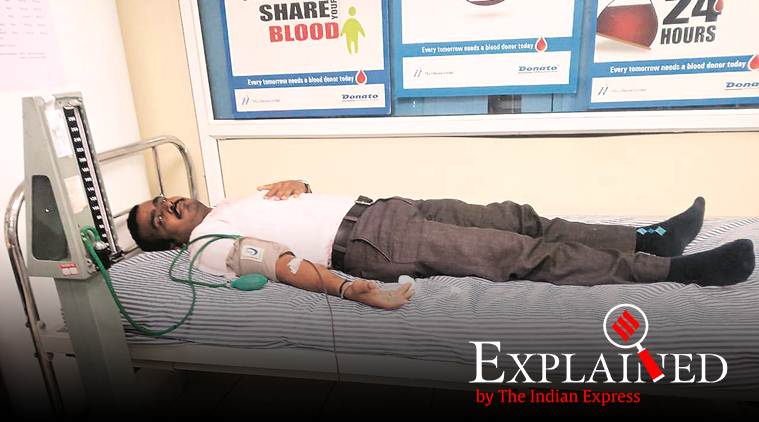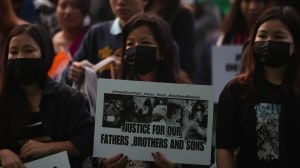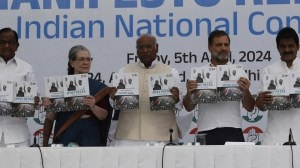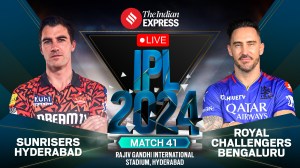- India
- International
Explained: What is Bombay blood group, rare and sought after?
The four most common blood groups are A, B, AB and O. The rare, Bombay blood group was first discovered in Mumbai (then Bombay) in 1952 by Dr Y M Bhende.
 Harshal Ware, whose type is Bombay blood group, donates a unit in Pune. (Source: Think Foundation)
Harshal Ware, whose type is Bombay blood group, donates a unit in Pune. (Source: Think Foundation)
Over the last two weeks, the “Bombay blood group”, a rare blood type, has been at the centre of attention in Mumbai’s healthcare scene. Demand for the blood type has coincidentally spiked at hospitals, but supply has been scarce.
Blood types, common & rare
The four most common blood groups are A, B, AB and O. The rare, Bombay blood group was first discovered in Mumbai (then Bombay) in 1952 by Dr Y M Bhende. Each red blood cell has antigen over its surface, which helps determine which group it belongs to. The Bombay blood group, also called hh, is deficient in expressing antigen H, meaning the RBC has no antigen H. For instance, in the AB blood group, both antigens A and B are found. A will have A antigens; B will have B antigens. In hh, there are no A or B antigens.
Rare in India, rarer globally
Globally, the hh blood type has an incidence of one in four million. It has a higher incidence in South Asia; in India, one in 7,600 to 10,000 are born with this type.
Dr Arun Thorat, in-charge of Maharashtra State Blood Transfusion Council, said this blood type is more common in South Asia than anywhere else because of inbreeding and close community marriages. “It is genetically passed,” he said. Shared common ancestry among Indians, Sri Lankans, Pakistanis and Bangladeshis has led to more cases of hh blood phenotype in this region.
Testing for the group
To test for hh blood, an Antigen H blood test is required. Often the hh blood group is confused with the O group. The difference is that the O group has Antigen H, while the hh group does not.

If anyone lacks Antigen H, it does not mean he or she suffers from poor immunity or may be more prone to diseases. Their counts for haemoglobin, platelets, white blood cells and red blood cells are similar to the count of others based on their health index. Because of rarity, however, they do face problems during blood transfusion.
Transfusion limitations
A 2015 study in the Asian Journal of Transfusion Science observed: “The individuals with Bombay blood group can only be transfused autologous blood or blood from individuals of Bombay hh phenotype only which is very rare.” Rejection may occur if they receive blood from A, B, AB or O blood group. In contrast, hh blood group can donate their blood to ABO blood types.
An unofficial registry for Bombay blood group lists over 350 donors across India. “But at any time there are only 30 active donors available,” said Vinay Shetty of Think Foundation, an NGO. This group is generally not stored in blood banks, mainly because it is rare and the shelf life of blood is 35-42 days. So, whenever there is a demand for a Bombay blood group patient, a donor is required very urgently. Sometimes, facilities need to be created for transporting the donated blood from one city to another. Two weeks ago, a patient in Kota got hh blood from a Pune-based donor. The blood was flown to Jaipur and taken to Kota hospital by road.
Shortage in focus
The spike in demand is coincidental, said Shetty. Last week, he received requests from three hospitals in Mumbai for multiple hh blood type patients. Two of them are cancer patients in Tata Memorial Hospital.
Patients of this blood group could die for want of blood. In Sri Lanka in 2017, a cancer patient died for want of hh blood group negative.
More Explained
EXPRESS OPINION
Apr 25: Latest News
- 01
- 02
- 03
- 04
- 05










































